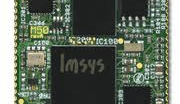Compact M2M communication module features native Java support
on

The new SNAP Stamp module is the smallest and most cost effective member of the Imsys SNAP family. Measuring just 29 x 29 mm, the SNAP Stamp module is based on the Imsys IM3000 family of processors, which can execute key routines – including Java bytecode – internally. This allows user’s Java applications to run natively without the slowness of Java interpretation or the need for a resource-hungry just-in-time compiler.
The SNAP Stamp module provides everything necessary for the intelligent control of a networked product, including an IM3910 MCU, SDRAM, flash memory, 10/100 Ethernet PHY (and an RMII interface for a second Ethernet port), three UARTs, SPI/I²C, RTC, eight timers, an eight-channel 16-bit ADC, two 16-bit DACs, and a high-speed (83 MB/s) data channel. The module is SMT compatible and is supplied on tape for automatic assembly.
Firmware and application software can be loaded, managed, and upgraded remotely through the network port. Operating from a 3 to 3.6 V supply voltage, the device has a typical active current consumption of 50 mA. System software bundled with the module includes the Rubus real-time operating system, a fail-safe flash file system with wear levelling and power fail recovery, the TCP/IP stack, a J2ME/CLDC environment, Web / FTP / Telnet servers, device drivers for various I/O interfaces, and a user-friendly command line interface. Development kit hardware and reference designs are available.
The Java environment greatly accelerates development, increases software reliability and eases deployment. Java class files generated by any Java IDE (Eclipse, Netbeans) are directly executable on the SNAP Stamp. Imsys Developer (a complete Windows-based IDE) can be utilized for hardware debugging and software development in Java, C and assembly language, with breakpoints and single step debugging at all levels, dynamic variable inspection, event logging, etc.
Image: Imsys



Discussion (0 comments)